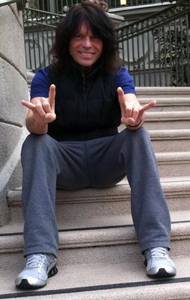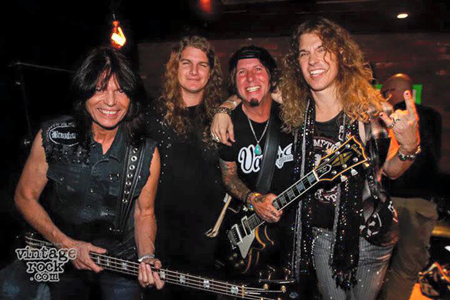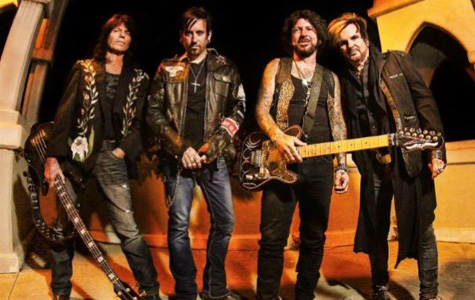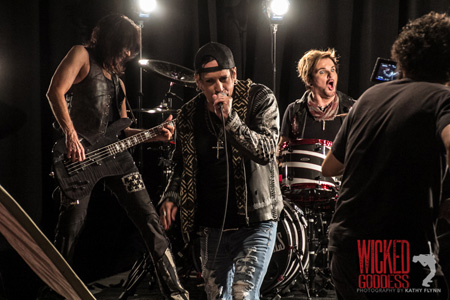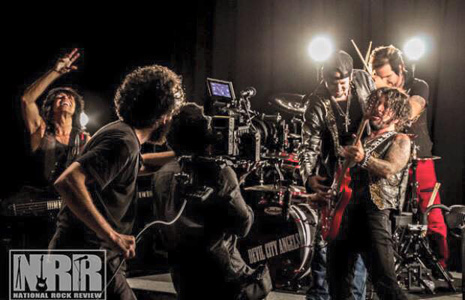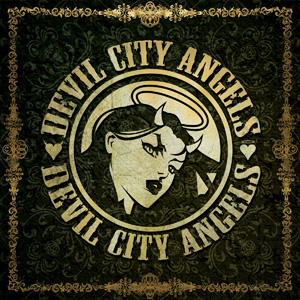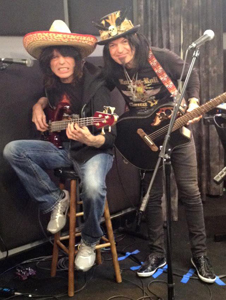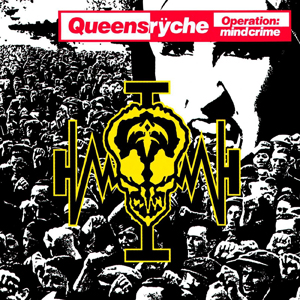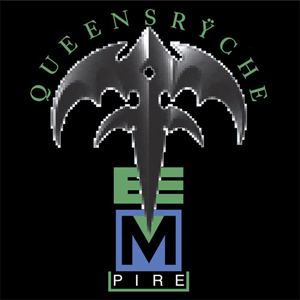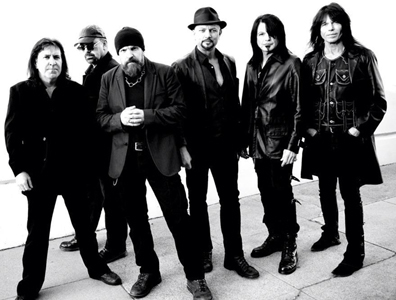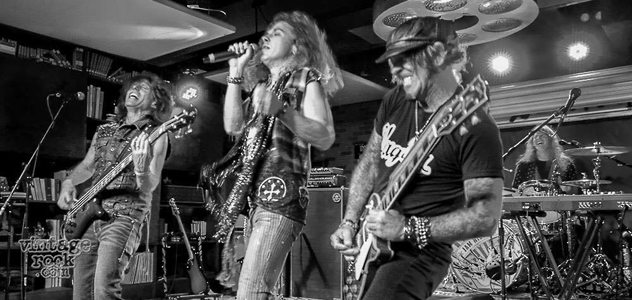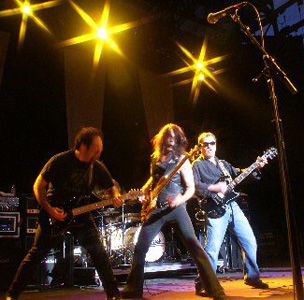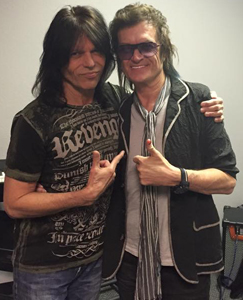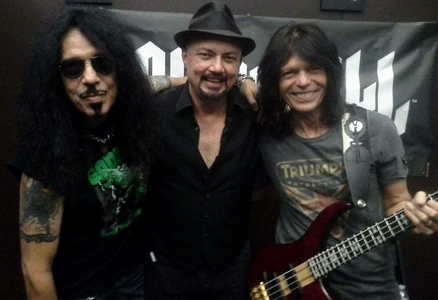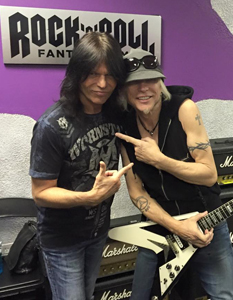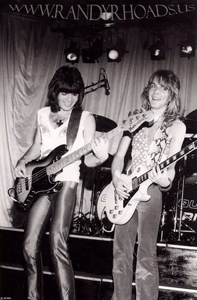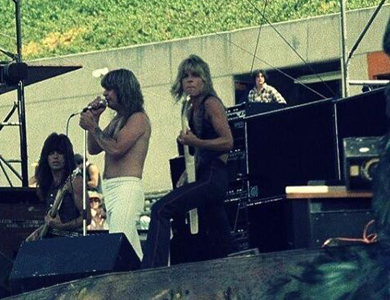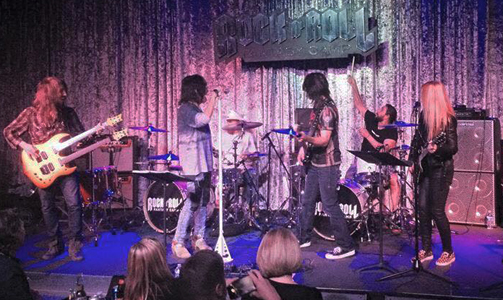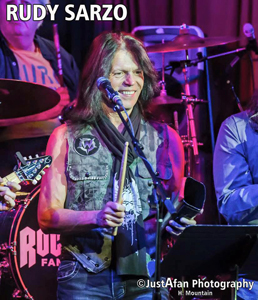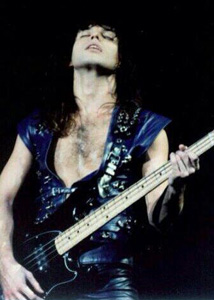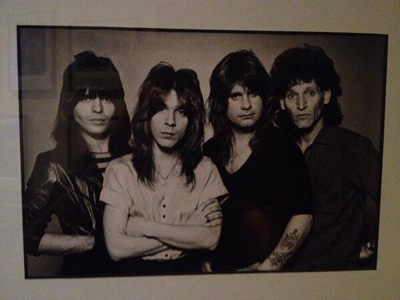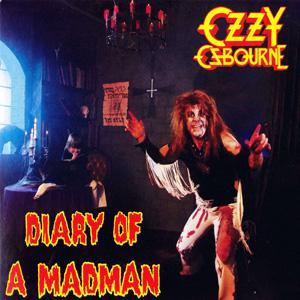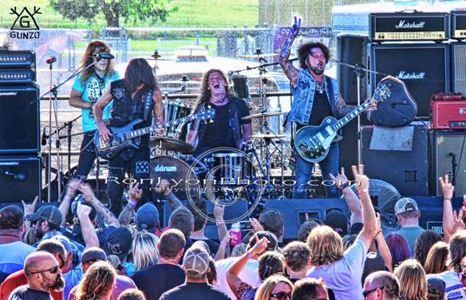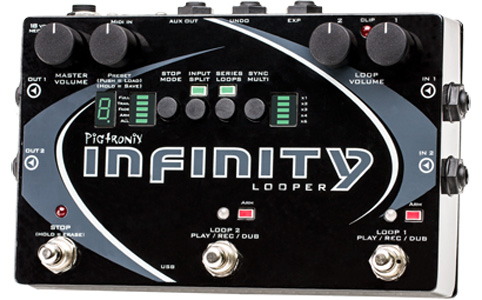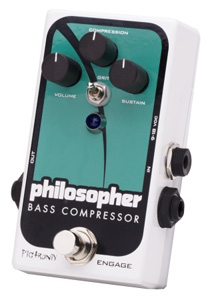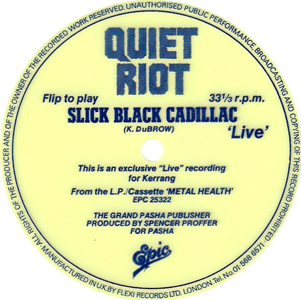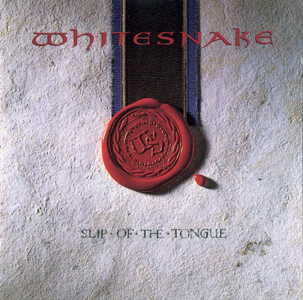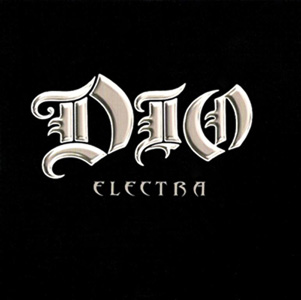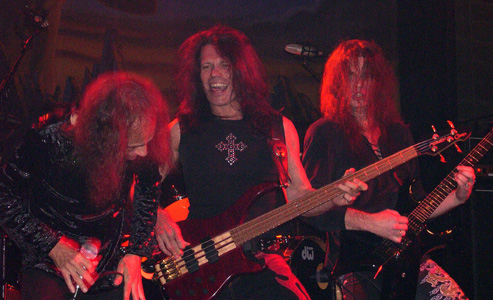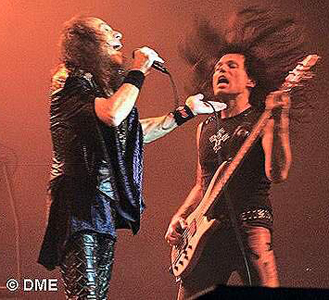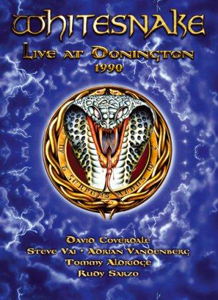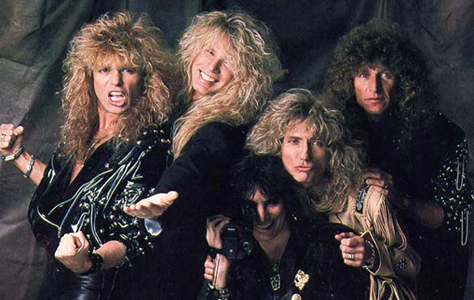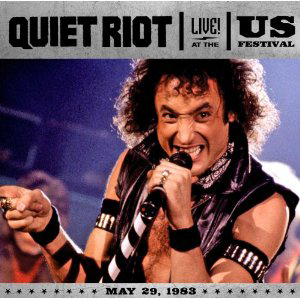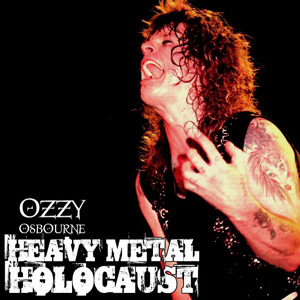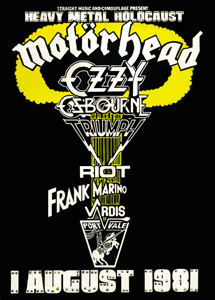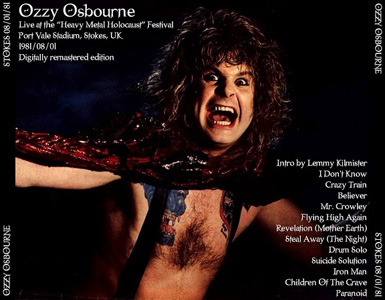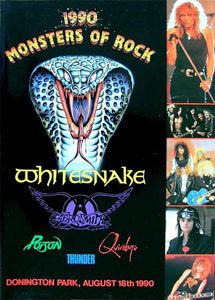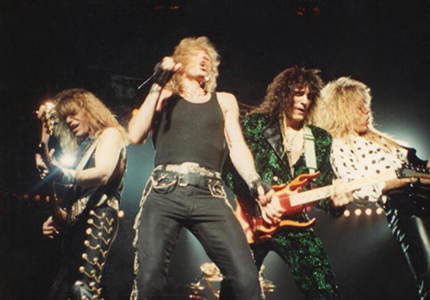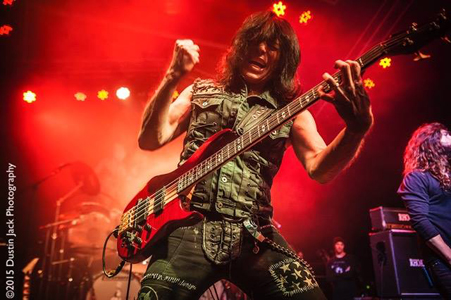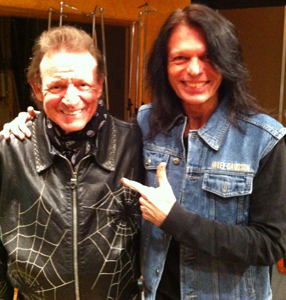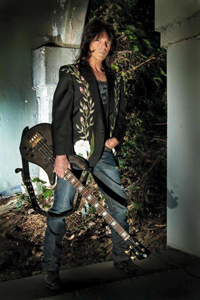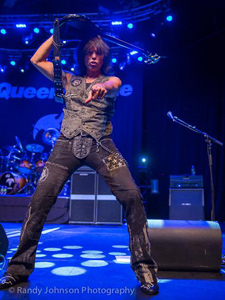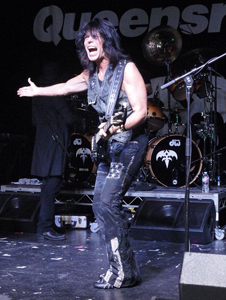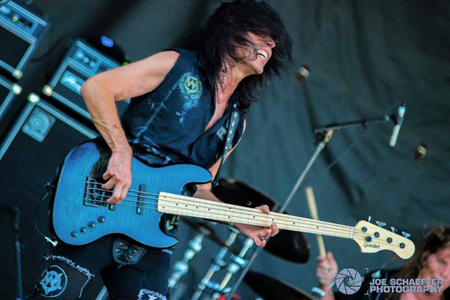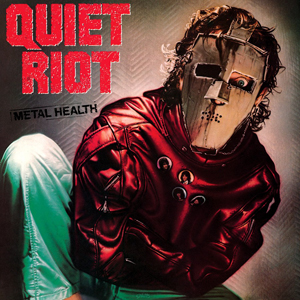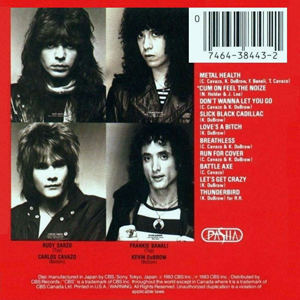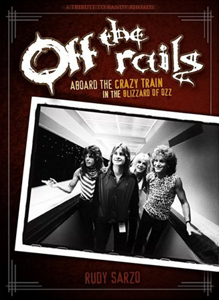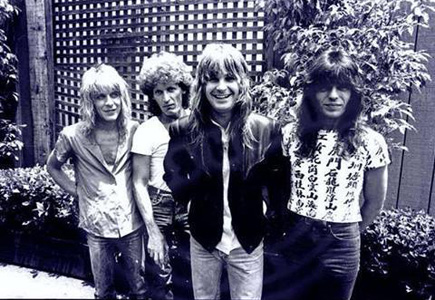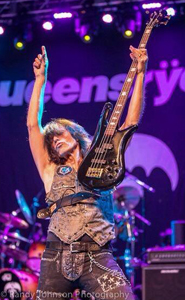An Interview with 'Rudy Sarzo'
Bassist of Devil City Angels & Gunzo (with former bands including Quiet Riot, Whitesnake & Dio) that took place on October 3rd, 2015. Interviewed By Glenn Milligan. Glenn: Hi, it’s Glenn, how are you doing? Rudy: How you doing Glenn? Good evening to you. Glenn: Thanks Bro, it’s 6pm here. You’ve just come off the Gunzo Tour with Tracii (Guns), how was that for you? Rudy: It was fun. It was a lot of fun. I’ve never done a club tour in the UK before. It had its challenges but all in all it was really good. It was great to be able to play back in England because I haven’t been there since I toured with Dio back in 2007. We played everywhere. Glenn: What stood out from the Gunzo gigs? Rudy: Everything. Getting to play with two great up and coming bands like Chase The Ace and Stone Trigger. It’s great to see that the new generation has a lot of incredible passion for playing music. Actually, it was the first tour we did with our new singer , Michael Amera, so it was getting to know each other musically as people – travelling together and so on. So it was really a great experience to be going through that.
Glenn: Our new Live Reviewer, Steve Baronovich managed to review the show in Sheffield for the zine. How was that show? Rudy: Sheffield was a last minute addition because we were going to have the day off on a Saturday. It was like, “Hell No! – We gotta play somewhere!”. So we told the agent, just fins us a place to play on the way to Manchester. So that’s how that gig came about. What happened is that somebody cancelled that show on the last minute so there was an opening and they brought us in. Glenn: Awesome. You’ve been part of ‘Devil City Angels’ for a few months. How did that come to be? Rudy: The record just came out, maybe a couple of weeks ago and I had been playing with Tracii in Gunzo and when Eric Brittingham who got to record the album (the orginal bass player), he left the band, so they asked me.. Of course, I was already playing with Tracii and also I’ve know Rikki Rocket from the days when Whitesnake and Poison used to tour together back in the late 80’s and early 90’s. We did the ‘Monsters Of Rock Tour’ in 1990 together, so I’ve known Rikki for a long time. I guess I was the sensible choice (laughs). Glenn: Yeah, you know how each other works and you are used to being around each other. Rudy: Yeah, of course. It just made sense. Brandon Gibbs is such a great singer and I’m all about working with great vocalists. So when I heard the record… I actually saw them perform live about a year ago in Las Vegas and I was really blown away even before I even thought about a possibility of me joining the band. I just watched them as a fan and I was really, really blown by the whole thing.
Glenn: Awesome. Were there certain songs that stood out to you from the band that you are looking forward to putting your bass part to?
Rudy: Oh no. I am looking forward to the new record so I can make my own contributions. I’m not one of these guys that goes in there and disrespects what the other musician has done because it’s not just what the bass part is all about as far as regarding about being the musician. It’s what really fits for the song. So I’m all about playing the right part for the song rather than to go in there and letting my ego get in the way and say, “Oh well, I’m gonna play it different” because it’s usually not good for the band. Glenn: Are you writing material right now as we speak? Is there stuff they have not used from the first album that you can talk about or is that way far into the future? Rudy: Well to me, the way I look at it, it's a throwback to 70's Rock N Roll and I grew up with that. I used to be in a bamnd called Quiet Riot with Randy Rhoads - especially that version of the band. It was in the 70's so we were playing 70's music but it was that good time rock 'n' roll. The band back then was very much influenced by Humble and Mott The Hoople and a bit of Queen because Queen were so broad in their musical genres and also Bowie. Kinda like Glam Rock - Good time rock 'n' roll. So this is what Devil City Angels reminds me of. A bit of the Rod Stewart And The Faces thown in there. Bluesy and really good time blues based rock 'n' roll. Glenn: Yeah it's all starting to come back as well. Rudy: It would be nice to hear more new music in that style. Glenn: Yeah I agree. Rudy: Yeah.
Glenn: Yeah most of my favourite bands are Humble Pie and guys like that. They are so real and passionate and soulful – it’s just pure meat and potato blues rock and just get it out there and just have a good time with it like the Faces used to do. Rudy: Yeah, exactly and I really miss that. Even the people that used to play that type of music like Rod Stewart, he’s so far removed from that – he’s doing like 1940’s standards like Cole Porter music – The American Songbook, which is fine. That part of him of his growing up. So as a fan I love to hear him go back to ‘Gasoline Alley’ and any of those great records that he put out. Glenn: Yeah. I like the old Faces stuff when you’ve got tracks like ‘Bad ‘N’ Ruin’ or their cover of Bob Dylan’s ‘Wicked Messenger’ – songs like that. That sounds controversial but I prefer some of the old Faces stuff to some of the hits of Rod Stewart if that makes any sense? Rudy: Yeah exactly. Fortunately we have a great singer in Brandon who can actually sing that. It takes a lot of personality and character – somebody that knows how to sing, not just somebody who’s got a good voice. There’s a big difference between having a good voice and being a great singer. It’s like anybody owning a 1957 Les Paul – “Well that’s great, you have a great sounding guitar, now let me hear you play it!” Glenn: Yeah, yeah. (I laugh) Rudy: It’s a big difference. Just because somebody has a great voice doesn’t make them a great singer.
Glenn: Exactly and you’ve got to be a good frontman to be able to carry it over as well for the band and the songs and everything else. Rudy: Yeah. But you know what, I’ve seen great frontmen with average voices. I’d rather hear a great singer. To me, Paul Rodgers was always a better singer than a great frontman. Of course, he is like my dream vocalist but he’s not necessarily Rod Stewart – a guy onstage running around performing and connecting with the audience. Paul Rodgers was a guy who just delivered balls-out, a great delivery and beautiful voice and everything. He was like a singers singer, but not necessarily somebody that’s gonna be a Mick Jagger. Glenn: Yeah. You’re lucky you managed to get that in Brandon. I was actually watching footage of the band tonight and thinking, ‘Wow that guy’s got it and the band is so together.’ I can’t wait to see the Devil City Angels come to the UK. That could be happening and I guess you have got the agents to look into it? Rudy: Yeah. What we’re doing is, is we’re letting the album, the ‘Devil City Angels’ record go out there for about a month and see where we are getting the biggest buzz globally(and see) where are market is going to be. Then we are going to strategically target those areas first and then build from there.
Glenn: It makes a lot of sense. You’d go down amazing over here. It’s a no-brainer. Especially when you’ve just played the stuff with Gunzo. I mean, Rikki Rockett’s not been over here for years and that’s going to be like a major draw for a draw. It would be absolutely amazing. Rudy: Yeah. We are definitely aware of that and the agent that we are working with is very aware of that. Nowadays you have to be so precise with your marketing and promotion of any group and we’re taking social media into major consideration. We’re using that as a barometer. Glenn: Yeah. It makes an awful lot of sense there. You and your brother, Robert are there in the new version of Queensryche with Geoff Tate. How was that like for you working alongside your brother? Rudy: Oh it was wonderful. I’ve never been in a national touring band with my brother before so this was definitely one of those great opportunities to be able to do that, Again, like I mentioned before, I’m all about great singers, so working with Geoff Tate – that was amazing. What an incredible vocalist he is!
Glenn: Totally. One of the best! Rudy: He’s definitely one of those guys who owns a beautiful instrument in his voice and knows how to use it. Glenn: And you’re having so much fun out there. I can tell you own the stage somewhat with your posing on the bass and really getting it together with it and having a good time. It’s just written all over your face. Rudy: Yeah, yeah and getting to play wonderful music. I mean, we were doing ‘Operation Mindcrime’ – the album and a lot of songs from ‘Empire’. That’s world class beautiful, beautiful music and really well-crafted songs.
Glenn: Would you say that any particular shows stand out from that tour that you did Geoff? Rudy: Oh my goodness! We did a festival in Brazil. I was playing in front of a large audience and that really sticks out. Unfortunately I didn’t get to tour with the band in the UK or even in Europe. I would have loved to have done that. My touring was mostly in the US and then we did that one festival in Brazil. There were all great shows. I would say playing in Los Angeles – a sold out show at the Nokia Theatre – Downtown L.A. That was early on in the tour. That was really amazing. Glenn: Nice. I know he’s been recording a new album. How was that recording with Geoff? Rudy: It was great. It was one of those situations that… it was early on. We got to record before we even toured. Again, for example, the reason why we’re doing Gunzo is because we’re getting to the stage right now… I told Tracii, “When we do the album, let’s do it the old way. Let’s do it like we already know each other musically and we’re gonna make a record”, rather than nowadays people get together and say, “Hey, I’ve got these songs, I’m gonna send you some through the internet”. Then they’ll send you some tracks and want you to lay down a bass and you really don’t know each other musically so you’re doing a lot of second guessing. Sometimes, I’m not saying specifically with Geoff, but I get a lot of tracks with no vocals. So you’ve to guess and play something that doesn’t get in the way of something that doesn’t exist yet. Glenn: (I laugh) That’s a nightmare isn’t it? Rudy: Yes. So you are kind of like playing it safe somehow but then trying to be creative at the same time. It’s not like in the old days where you go into pre-production and work on the record for a couple of weeks and everything is kind of like laid out because at least you have a sketch of what the vocal is going to be like and you know where the holes are. That’s the whole thing. Where are the holes in here? Where can do like little melodies and things that bring in like… going from the verse through the b section through the chorus and where’s the bridge? and where’s the breakdown? You won’t get a sense of that most of the time when I get to record with these tracks that are given to me. Sometimes I even ask for a ghost bass because I don’t even know who this person is. I don’t even know what they look like. So they want me to play on it. I don’t even know what you think I should be playing as a Producer. When you work with a Producer there’s guidance there. There’s somebody who looks at the big picture. I listen to a song without a bass and, oh my god, there’s a hundred possibilities that I can play (laughs).
Glenn: Exactly. Rudy: You are basically hiring me to play on your tracks. Give me a direction. What do you expect from me? I could give you a hundred different variations of what I think for my bass contribution. So a lot of times it’s very challenging and I wind up being safe. So when I was approached to play on the three tracks that I played on that record, it was a little bit of that. A little bit of like ‘mmmm?’ I don’t know? I could go in so many ways. There’s a little bit of a safety factor when you approached. Then when you start playing live, that’s when the song starts taking a whole different shape and form. In a lot of times that’s what happens. When you make a record, you take those songs on the road and that’s when they start coming alive, on the road because it starts making sense. You start to live the music rather than just playing notes. Glenn: Yeah and then you really find out what works while you’re on the road and you see the expression from the other members and the crowd and you’re thinking, ‘Yep – we got ‘em’. Do you find you have to alter certain bits to make them work better once you are in that live situation or does it all click together? Rudy: Yeah. You know, if you take into consideration the origin of what we do as musicians – we communicate – we talk to each other with music. If you start playing on a track that already somebody made a statement and let’s say, ‘the drums’ and you have to play on top of that. You’re not really talking. You’re kind of like listening and a statement has been made. So you have to bring your own statement that is in sync with what’s already been laid down. You’re not really communicating. You’re not really talking to each other. You’re basically listening and reaffirming what statement has been made musically or rhythmically.When you’re playing live, it’s a constant conversation to the point where the best bands I have ever been in is when we challenge each other musically which is another thing that we wanted to do with Gunzo. We went out there and we started challenging each other musically live with music that was familiar to us and to the fans. Every night is completely different. We wanted to have that. When we go in and make the record, we are going to do it live. We are going to be going in the studio, lay down every track live – not like all these overdubs and you send me something and I’m gonna play what I think it should be. No, No – this is interactive – the way it used to be when all those great records wee made. Everybody in the same room at the same time. (laughs)
Glenn: I agree with you completely because you get bands that are trying to create that when they put bits together but you can feel the interaction and the warmth and the personality coming off the old albums and you don’t always get that the same with all these parts that work together. I think that’s what makes these classic bands and these classic albums from like 20 or 30 years ago because it’s there. If you do that it’s going to work perfect. The method’s been proven to be the best way of going about things. Rudy: Yeah. I was playing for a while with Blue Oyster Cult and they were a perfect example because they’d been around since the 70’s. I used to talk to the guys – Eric Bloom and Buck Gardner about the process because I learned about 50 of their songs because at any time Eric Bloom would just pull something out of the air, like something obscure. I had to be ready. A lot of things in learning the music that really attracted me through to the band was how different everything sounded from each other but still had that quality – extra high quality. That was because they would work at one song at a time. It wasn’t like, “Okay, we’re gonna lay all the drums for the album and then we lay down all the bass and then we lay all the guitar”. No, it was like they went into record ‘(Don’t Fear) The Reaper’ and once they had finished they recorded the next song. To me, that gives the song a special focus and attention to detail that if you do it like an assembly line recording it, it doesn’t have the same effect.
Glenn: Yeah. I totally agree with you there. I think that’s what’s been missing for a long, long time and people are just starting to realise it again. Technology has taken over too much and it’s just messing things up and people don’t realise it until a bit later. We should realise that sort of stuff, you know? (I laugh) There you go. Rudy: Yes, Yes. Glenn: You’ve got the 'Rock And Roll Fantasy Camp' coming up which you’ve been doing for many years. Rudy: It’s been around for over 15 years. Maybe closer to 20 by now. I’ve only been doing it for about 8 as of last year. Glenn: How did you get involved with that and what does it mean to you to be involved with 'Rock And Roll Fantasy Camp'? Rudy: That is a really good question. I got involved through Bruce Kulick. It’s a very tight circle of masterful musicians. People with legacies. We have counsellors – not just special guests because we get a lot of guests but the actual people who get to work with the campers are called Counsellors. Anyone from Mark Farner to Kip Winger to Bruce Kulick and Vinny Appice. People with huge musical legacies. At least multi-platinum artists. What I did out on the camp is to be able to give back. I’ve been teaching since the mid 70’s. Actually in the late 70’s when I joined Quiet Riot and Randy Rhoads, his mum hired me to be a bass teacher at her school, Musonia.
Glenn: No Way! Rudy: So that was my first experience of teaching and I learned a lot about being a teacher from Randy because he was teaching in the room next to me and he had an incredible roster of students. He had maybe 70, so he was teaching for hours and hours and at an incredible standard and focus as a teacher and also the fact that he really loved it. People ask me with one word, how can I describe Randy and it’s either ‘Teacher’ or ‘Mentor’ because that’s one aspect of Randy that he had from the Quiet Riot days. He was able to bring that into the Ozzy days and that’s one thing that was constant with him. He was able to share knowledge – musical knowledge with others. If you ever look at a photo of Randy Rhoads, notice how he’s holding the guitar. I think that’s what years of teaching that he looks like he is showing you what he is playing with so much clarity. He was never one of those guys who would turn around and do some kind of an amazing lick and you were like, “What are they doing?” because you can’t see him. He was like right in your face and showing it to the first 20 rows in front of him. He was giving a guitar lesson.
Glenn: Yeah. I was just about to say that. He was teaching them how to play and how to put it across. Yeah!
Rudy: Yeah. I find that just about every musician that I talk to who’s been around as long as I have, we all get to a stage when it’s all about sharing – sharing information. We take a lot of joy in doing that. In fact, I have my own line of Bass Academies called ‘Rudy Sarzo’s Bass Academy’ and I teach bass online. As a matter of fact, I have a few students from England right now. Glenn: Nice! Rudy: Yeah. So it’s a lot of joy and it’s really rewarding to be able to do that. To give back – to giving back to people who actually have their own aspirations of becoming a professional musician. For some reason, they became Doctors and Lawyers and Architects – thank god that they did because we need more Doctors than we need musicians. (We laugh) Glenn: For when all you guys get sick. (I laugh) Exactly. You should have become a Doctor you know? (I laugh) Rudy: Yeah exactly. Glenn: When you’ve been working with the people, you get to put that show on as well at the Whisky A Go-Go which is great, to show how it’s all gone and when you’ve perfected it all. That must be such a buzz for you all to do that. Rudy: Yeah. Absolutely. Again, going back to Rock And Roll Fantasy Camp, one thing that I always want the camper to get out of the camp at least, is the fact that you are a musician. You are a dentist, yet also you are a musician in whatever instrument you might play. You really shouldn’t have to think of music as something you have to do for a job or a vocation – music is to be shared by everybody, whether if you make a living from it or not.
Glenn: I mean, to be doing it that long, it’s not just about making money, it’s about having a passion and love and the joy of doing it in the first place which is why you did it. Rudy: Yes exactly. Glenn: I noticed you have something called ‘Project Rock’ with members of Judas Priest and Guns ‘N’ Roses. Rudy: Yeah. That all came about because originally it was very Russian specifics. I got the call a few years ago to be part of this band – James Kottak from Scorpions, Keri Kelli from Alice Cooper, Ripper Owens from Judas Priest and Teddy Zigzag who was a keyboard player with Guns ‘N’ Roses and myself. It was all about going to Russia. When I say going to Russia, I just don’t mean Moscow where everybody plays. I am talking about going deep like spending three weeks touring in Russia. Now, I’m Cuban and my family left Cuba because it became Communist. So whenever I have an opportunity to play in a former Soviet/Communist Country I’m there because I understand. I understand what they had to go through and that fact that a lot of these cities that we play at, the major touring bands, they skip because it doesn’t make any sense for them. But for us it does because we are able to play theatres. A lot of these bands – they are too large to play theatres. So we’ll play in front of 3000 people. We bring to them, ‘We are musicians – we’ve been in those bands’ and play that music. There’s so much joy. There’s so much appreciation in the fact that we’re coming over to play for them. For me, it’s incredibly rewarding. That’s what ‘Project Rock’ is all about! Glenn: That sounds absolutely awesome. You’re giving it back to the people who have not had chance to see it. You can’t top that can you? That’s great. Rudy: Yeah exactly. Like if Judas Priest play in Russia, they’ll Moscoc, they’ll play St. Petersburg and they’ll play in a stadium. But it doesn’t make sense for them to play a theatre in Kanchatka. (We laugh) Glenn: Just to look at what you’ve done, it’s just a total wikipedia of Rock and Roll and Metal overall. If you could pick certain members of certain bands that you’ve been part of, what members would you have in that one band and why? What would you want to play with them? Rudy: It’s very simple – the Ozzy Osbourne band with Randy and Tommy Aldridge and myself – of course Ozzy (laughs) and Don Airey. To me that was the epitome of going on stage – ‘The Diary Of A Madman Tour’. It just felt like every night was a Superbowl.
Glenn: Awesome. Rudy: Simply that. Of course it meant so much to you that you wrote a book all about it as well back in 2006. Second, I would definitely say overall Whitesnake because it was such a powerhouse. Of course again, Tommy Aldridge on drums. Vocalist, definitely Ronnie James Dio. Ronnie James Dio was the dream singer for me to work with. It’s hard to pick one because certain ones have incredible elements. Also, a band that I was a part of from both bands, original member Quiet Riot. So that building process of going from running around in a station wagon to having a number 1 album. That also has its unforgettable qualities about it. Glenn: Yeah – a great band. Could you imagine yourself doing a solo bass album like some people do? Rudy: No. Glenn: Not your thing? Rudy: No. It’s because some of the bass albums that I listen to are jazz oriented and progressive and I’m not known as a progressive jazz player even though I listen to that music. I grew up with it but that is not where my market is. Glenn: You are more Rock & Metal full-on. Rudy: Yeah, yeah. I am definitely a team player. I got into music because I was a baseball fan. I look as a band as a team and there’s no ‘I’ in the word ‘Team’.
Glenn: Hahaha – we use that phrase a lot here. It’s the best term ever isn’t it that one? Rudy: Yeah. In my favourite bands everybody kicked ass. To me, it’s all about that. Glenn: I must ask you, what was Yngwie Malmsteen like to work alongside? Rudy: It was phenomenal and musically I played with him at a time when I really needed that ‘play as many notes as you can freedom’. It’s like license to play as many notes – there’s no overplaying. That word doesn’t exist in Yngwie’s vocabulary. It was challenging and it was rewarding. I had a wonderful time. I learned a lot. It freed me. It was musically liberating playing with him and it’s something that I really needed. It looks like a purge. Like opening up the dam and letting it all flow. Yes, it was fantastic. Glenn: Awesome! I guess you let him throw the plectrums around and you just kept your plectrums in your hand so to speak. Rudy: Well actually I got to play along with finger. I’ve been doing it for many years. I do this technique but with one finger I can play and emulate a pic. So I use that a lot when I played with him just to keep up with those 180 beats per minute with all those notes. Glenn: You got a few endorsements. You’ve got Pigtronix. What made you want to get involved with those guys? Rudy: They are a great, wonderful company. Very forward thinking and very progressive. Right now I’m looking at my Infinity Loop Pedal and my Pigtronix Philosopher. Those are two pedals I have. I don’t use the Looper live but definitely the Philospher – I take that with me wherever I go. It’s a great compressor.
Glenn: Cool. Are there certain songs that mean the most to you that you’ve played on or been on from creation over the years? Rudy: Yeah. I would say ‘Thunderbird’. A song that got me back into playing with Quiet Riot because Kevin Dubrow asked me to play on just that one song while I was still a member of Ozzy. Just as a tribute to Randy. At the time Quiet Riot wasn’t officially named Quiet Riot yet. It was just building tracks for a production deal that was being put together. There was no label in place yet or anything like that. So I went into the studio to record ‘Thunderbird’. A song that I actually used to play with Kevin in his band ‘Dubrow’ before I joined Ozzy. Also during that session I got to record about three or four other songs that wound up on the ‘Metal Health’ record that one night. That was my introduction to what became the ‘Metal Health’ version of Quiet Riot. So that song has a lot of deep meaning to me beyond just playing on it. Also, ‘Slick Black Cadillac’ because that was the only left-over song from the Randy Rhoads era that wound up on the ‘Metal Health’ record. Songs from ‘Slip Of The Tongue’ – I have a lot of great memories of working and doing the pre-production for that record with Whitesnake. We spent about three weeks working on the pre-production before we actually went in the studio with that. There’s a song that was the only time I got to record in the studio for an original song with Ronnie James Dio which would be a track for ‘Magica 2’ which is a song called ‘Electra’. Working on that tune., you know, anytime you worked with Ronnie… Ronnie was the most musical singer I’ve ever worked with because before he became a singer he was actually a trumpet player. Then he was a bass player.
Glenn: Yeah, I noticed that! Rudy: Then he became a front-man. So I have incredible respect for Ronnie’s ideas and guidance because he would put together demos of material and I would go over to his house. By then he had a full pro-tools rig and he played everything. Glenn: Yeah? Rudy: Yeah, Yeah. It was just amazing to hear him develop music. He would play the guitar & he would play the keyboards. Simon Wright actually programmed the drums and Ronnie would sing on it which was the most significant part. It was just amazing to hear him through his craftsmanship of composing all these incredible songs. Glenn: Yeah he’s someone that we all miss. There’s no one that could ever fill that space that Ronnie’s left! Rudy: No. I was really, really, really, really depressed for so many reasons but one of them being the fact that after Ronnie died I was really lost musically even though I was still playing with Blue Oyster Cult. But what Ronnie would bring through on stage whenever I was playing with him I didn’t have that anymore and I didn’t have that to look forward to anymore. So I was really, really, really depressed musically and I’m still looking for that. It’s not just… and I have to say Geoff Tate it’s somebody who has… of course nobody sounds like Ronnie and nobody sings like Ronnie but Geoff is somebody who can actually sing and not just having a great voice but really personifying the lyrics without thing about it.
Glenn: Projecting it over at certain times? Rudy: Yeah. Geoff is certainly one of those guys. He has those qualities but even just the way that Ronnie sang, it was beyond what I’ve experienced with anybody out there. Glenn: I mean the thing is, it’s always incredible to see that such a little guy could produce that voice. It was like, “Where the hell did that come from?” Rudy: Again, it’s not just the voice. It’s just the way he used it. The voice was just his beautiful instrument but he really knew how to play that instrument. Glenn: Yeah I agree there. I know you’ve been in many bands and played countless shows throughout your career but could you possibly pin-point any shows that you’ve done over the years that stand out? Rudy: I’m going to say Donington 1990 with Whitesnake. There’s even a DVD of it out. It was significant to me because I grew up being influenced by the British Invasion so anytime I get to play in England is very significant to me. To be able to headline with Whitesnake at Donington it was fulfilling a bucketlist (we laugh) because I really didn’t get to play that many shows with Ozzy in England. I mean, we did Port Vale – that definitely sticks out too. It was the first time I had ever played in England ever. So to be able to in 1981 and to go out there with Ozzy, Randy and Tommy to play in a stadium, it really, really sticks out. But then again, we were not headlining. But then again, it was my first time there. That was incredible. We had a tour booked with Ozzy later on that year and because of medical reasons we had to cancel it so it didn’t fulfil my bucketlist like Donington did. Then of course, I think it was four or five sold out nights at Wembley Arena with Whitesnake. Before that, it was 1987 during Christmas. That’s another incredibly memorable experience.
Glenn: No doubt. I mean, as well you get to play with different levels of crowds from like a club to baseball stadiums to big arena. That must be pretty incredible. What effect does that have on you when you’re there in front of such a massive crowd? Rudy: Sometimes you have to weather the conditions because when we did the Us Festival in 1983 with Quiet Riot we were added on at the last minute so we were technically not prepared and it was kind of like guerrilla warfare to have some people set up some backline, no sound-check and just, “Okay, go onstage and play”. So sometimes you’re dealing with, “Wow – it’s so great to be here”, but “Oh my god, look at all these technical difficulties”. Like in my case, my bass rig didn’t work. Glenn: Nightmare! Rudy: (Laughs) I had to have my bass go through the monitors. That was the only way I could hear me and all the rest of the members of the band could hear my bass. I went through the monitor system which is not the ideal conditions but you have to go on with the show.
Glenn: You pulled it off though? Rudy: Yes. So again, we’re like, ‘Oh my good, look at all them – we are playing in front of 350,000 people.’ One side of me says that and the other side of me says, ‘Oh my god – my bass is not working – my bass amp (laughs). Glenn: That’s cool. That’s crazy. Rudy: Yeah. By the time we started headlining we are talking about with Whitesnake and giving a proper crew or with Ozzy at Port Vale then you can actually concentrate on the show.
Glenn: Yeah. You’ve played your U.S. shows and you come over to Europe and the UK, do you notice a dramatic difference between the crowd with regard to enthusiasm or what you get back off them or are they very similar? Rudy: Yeah, That’s interesting. That’s a really good question. Traditionally when you play festivals in England, especially in England, it’s more male dominated, especially the metal festivals. Not like the mixed festivals. I would say Donington. Donington was a Metalfest and you could see more males in the audience, whereas if you play in the United States it’s more even – more balanced. It becomes more of a date. (We laugh). Rather than guys just going out there – all of them wearing their denim jackets with the patches of their favourite metal bands which of course included Iron Maiden and Motorhead even much more than Ozzy (laughs) and Judas Priest of course.
Glenn: Yeah. It’s all good. It’s all good. Are there certain places in America that you'd like to play? Rudy: No. I mean, I’ve been touring since 1981. I’ve pretty much been everywhere. In America – let’s say we are including North America because I’ve been to just about everywhere in South America too. I’m looking forward to some day being able to play in Cuba. Glenn: Yeah. That’d be nice for you. Rudy: Yeah. That’s the number 1 on my bucketlist. Once the political conditions allow it. I would say in North America Nova Scotia – places like that because I’ve already played in Iceland. That’s very remote. I’ve played Iceland and I’ve played Tierra Del Fuego which is as far south as you can go and still be in South America. It’s like the tip of South America. Beyond Tierra Del Fuego you have Antarctica. I’ve been to extremes and that’s just every. Definitely Nova Scotia, Newfoundland. Glenn: Some of these places must take a long, long time to get to. How so you actually keep yourself going and what do you like to do to kill the boredom factor as such? Rudy: Now we have technology so I’m productive all the time. I’m always playing. I’m always learning new techniques and new music theory and putting that to new musical possibilities. A lot of them cannot really be applied in a Rock ‘N’ Roll context – it’s too outside within the blues based musical form. But for me, it’s all about learning and progressing as a musician whether it’s right hand technique, left hand technique. Now I’m getting a bit more into the flamenco picking style which is something that I can actually apply to playing bass. I’m always learning. You are teaching and learning. For me, that’s what it’s all about. Gathering information and then passing it on.
Glenn: What got you interested in learning how to play flamenco? Rudy: Well you’d be surprised with how many of the new extreme bass techniques. I call them extreme because I am old school. I grew up with guys who used to play with one finger like Jack Bruce and James Jamerson. Now everybody uses at least four fingers. Three fingers and a thumb and some of them throw in the pinky so it’s like all five fingers. I go on youtube and watch guys who are playing two basses at the same time.
Glenn: Holy Sh*t! Rudy: I go ‘God Bless You!’ (We laugh) I don’t have enough hours left in my lifetime to start going into that. To me, I just kind of draw the line on it and go, “Okay, I’m gonna get some flamenco techniques into my bass playing and take it from there and apply as many hours as possible because there’s no short-cuts. I believe that it takes a certain amount of hours to master any technique. There’s no short-cuts. So the more time you apply to it, the quicker you’ll be able to master it.
Glenn: What songs over the years have been the toughest to perfect and to learn so you are able to say, “I’m happy with that”. Are there certain things that stand out? Rudy: Yeah. It’s not really that musically it was tough, it was just conceptually it was tough. I mean anytime that you have to learn a concept album it has definite challenges because you learn it as one big piece rather than individual songs because it is all tied in together. I would say the learning of ‘Operation: Mindcrime’ was the toughest because we learnt the whole record and we had to perform it every single night. That was the most challenging because you have to learn one song right after the other because everything is a musical tapestry and you have to look at it as a big picture. As one big song rather than separate tunes. Glenn: How long did it take you to learn all that because it must have took an awful long time at your standard? Rudy: It took about two or three weeks. It wasn’t just memorising songs, it was the memorising sequence. You take it a song at a time then you learn it as a sequence and then I’d say as a whole piece. Then it becomes one big song. (laughs) One long 50-minute song. Glenn: So I guess if the call came on, “Rudy, we’ve got some shows booked, do you want to come in on bass again?”, you’d be looking forward to playing with Geoff again? Rudy: Well I never say never, it just felt like I needed after playing with Geoff in that version of Queensryche, I needed to go in a different direction because you are playing and it’s almost like programmed. You’re fulfilling (your obligations). It wasn’t as creative as what I’m doing right now in Gunzo because with Gunzo I have a lot of room. We’re not trying to play the songs the same every night. We’re not trying to play them exactly like the record. The function of us right now in Gunzo is to get to play each other musically and to challenge each other musically which is going to translate to where we’re going to be recording our album.
Glenn: That’s great. I mean, you’re a creator and not just a musician aren’t you? You want to be able to put your personality onto a song! Rudy: Yeah absolutely and not only that, you have to put personality on the record. Then that personality progresses. You know, like every great band, if you listen to the album and you listen to their live version five years later – it’s progressed, completely grown. One of the best examples is Led Zeppelin. Five years later when they were playing ‘Whole Lotta Love’ live or anything from the first album like ‘Dazed And Confused’ there was definitely a progression to that. Glenn: Yeah. You’ve learnt so much over the years from when you first started in bands, you’re going to be putting other things into songs now that you played way back then. It’s just a natural progression. Rudy: Yeah exactly. Glenn: That’s cool. So what do you enjoy doing outside music? Rudy: I enjoy my family. I enjoy hanging and going to the beach with my wife and my little dog and going to restaurants eating. Doing stuff like that. It does feel that music is what my life is all about. I got lasik a few years ago and people ask me the same question. Before I had lasik I was wearing glasses. It wasn’t very inspiring for me to play with my glasses on and as soon as I remove them and go on stage without them, my strings were really blurry so I was playing it very safe because I really couldn’t see what I was doing very well at all. At soon as I got lasiks I really got back into music again. Really deeply because I was trying to catch up with time lost and not applying myself to it. So right now, everything is music.
Glenn: You’ve got way more confidence when you can see what you’re doing and you feel good about everything then don’t you? Rudy: Oh yeah. You have to be inspiring. I highly recommend any musician out there who is suffering with his eyesight and if they want to free themselves from wearing glasses to actually check in to getting lasik. Glenn: I remember finding out that John Lennon refused to go on stage wearing his glasses in his Beatle days and he couldn’t see sh*t – but you know? Rudy: Well in the case of John Lennon, even though he was a phenomenal guitar player, he was mostly a rhythm guitar player and my problem with the glasses was if I wanted to play above the 12th fret, it would be underneath the frame. I would look down and it would drop. It would get fuzzy again because otherwise I would have to wear goggles in order to have the length of the whole fret-board. Even if I wore glasses, that was really hassle unless I was sitting around at home and then I’m holding my bass really high which is not a way that I wear on stage. Even glasses was not the answer for me on or offstage. So definitely lasiks changed the whole thing. Glenn: I guess you’re a lot happier on stage now than what you have been in the past. I bet not many people realise that. That’s a pretty interesting fact about you right there. Rudy: Yeah. It really has affected playing, prior to me getting lasiks. Glenn: You could talk for hours on this one but what have been your proudest moments? Rudy: Having a number 1 album at a time when to have a number 1 album meant that you were challenged by other artists such as Michael Jackson and The Police and all the big record sellers. It meant that you had sold a million copies in one week.
Glenn: Wow! Rudy: Being in a band that in March we were driving ourselves around in station wagons, following from gig to gig and then we got an RV – a recreational vehicle. Thern the records start going up the charts and MTV video that time in November. So from March to November, that’s how long it took to get to number 1. And the fact that we were the first considered metal because Metal has really changed through the years and we were considered the first metal band to have a debut album that reached number 1 in the billboard chart which was pretty significant back then. I would say definitely. Nothing to me could be more of a prouder moment musically than that. Glenn: What has been your craziest Spinal Tap moment or moments that you’ve endured over the years? Rudy: Being on tour with Ozzy was definitely never a dull moment. Glenn: I can imagine (I laugh). Rudy: Never a dull moment. It was fun crazy though. It was fun. It was incredible fun. I mean, Sharon and Ozzy, they were tremendous and we were all on the same bus. Back in the days it was like, you know, starting it out. Actually I lived with them also off the road. Sharon was incredibly gracious and she offered me because I was basically homeless. I was sleeping on the floor in this apartment. So the day that I joined Ozzy, I started living with them. It was just amazing. Here I am, they didn’t even know me and Sharon opened up her home because that was Sharon’s family’s house – a mansion over in the Hollywood Hills. That was incredibly gracious. I was there through everything. Every crazy moment. (We laugh). Glenn: Did you have to be careful what you wrote in your book? Rudy: No because it was crazy fun. It was fun.
Glenn: It’s all good. That’s killer. Right it’s been absolutely great having a good chat with you. I really appreciate it. Rudy: It’s my pleasure. You’ve really covered everything really, really well. Glenn: Thanks. That’s great. I really appreciate it Rudy. You have a good day and rest of weekend. I can’t wait to see you back across here either in Gunzo or Devil City Angels. I am looking forward to it Brother! Rudy: We’ll be back. Glenn: Thanks Brother! Rudy: Thank you.
A big thank you for Valerie Ince for placing me in touch with Rudy and of course the man himself for a brilliant interview! Images have been used with the permission of Rudy Sarzo |
